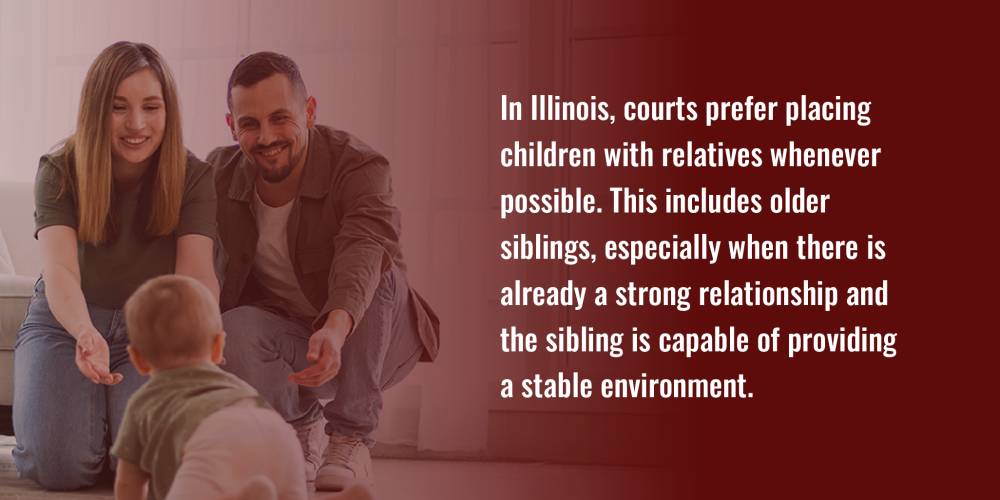 630-393-3111
630-393-3111
4200 Cantera Drive, Suite 200 | Warrenville, IL 60555
When Can an Older Sibling Become a Guardian in Illinois?
 Sometimes, older siblings take on responsibilities most people their age never expect. When parents pass away, go to jail, or lose their parental rights due to abuse, neglect, or mental illness, their children may be left without a legal caregiver. In these situations, Illinois law allows a court to appoint a legal guardian to protect and care for the child.
Sometimes, older siblings take on responsibilities most people their age never expect. When parents pass away, go to jail, or lose their parental rights due to abuse, neglect, or mental illness, their children may be left without a legal caregiver. In these situations, Illinois law allows a court to appoint a legal guardian to protect and care for the child.
One possible guardian is the child’s adult sibling. If you are in this situation, it is important to understand the steps involved and what the court looks for in a guardian. A DuPage County, IL guardianship attorney can help guide you through this complex and emotional process.
Understanding Legal Guardianship in Illinois
Legal guardianship gives someone the right and responsibility to care for a child whose parents cannot do so. The guardian is not a replacement parent, but they do have the authority to make decisions about the child's education, healthcare, housing, and overall well-being. Guardianship can be temporary or permanent, depending on the family’s needs and the child’s best interests. The guardian must act in good faith and always consider what is best for the child.
In Illinois, courts prefer placing children with relatives whenever possible. This includes older siblings, especially when there is already a strong relationship and the sibling is capable of providing a stable environment. However, the court does not automatically grant guardianship to family members. Judges have to make careful decisions based on many factors, and they will closely examine the situation before appointing a guardian.
Who Can Become a Legal Guardian in Illinois?
Illinois law lays out specific requirements for someone to be considered a guardian for a minor. According to 755 ILCS 5/11-3, a potential guardian must meet several standards:
-
Be at least 18 years old
-
Reside in the U.S, not necessarily a citizen
-
Be of sound mind
-
Not be legally disabled
-
Not have a felony conviction involving harm or threat to a child
Meeting these qualifications does not guarantee approval. The court will also consider the relationship between you and your siblings, as well as your lifestyle and income. The question is whether the child would be safe and supported in your care.
The Court’s Role in the Guardianship Process in Illinois
To begin the process, you must file a petition in the local probate court. As part of the case, other family members and interested parties also have to be notified. A hearing will be scheduled so the judge can hear testimony and review all the relevant information.
Under 755 ILCS 5/11-5, the court may approve the guardianship if it is in the child’s best interests. If a parent is still living but unable or unwilling to care for your sibling, the court must also determine that legal guardianship is necessary. If a deceased parent named a guardian in their will, that person will usually be appointed unless they are unfit or unavailable.
If your sibling is at least 14 years old, the judge may also ask for their input. Their opinion does not control the outcome, but it is often considered as part of the overall decision.

Responsibilities of a Legal Guardian in Illinois
Legal guardians must take full responsibility for the child’s well-being. That includes daily care, discipline, and planning for the future. According to 755 ILCS 5/11-13, if you are appointed your sibling’s guardian, you must always do what is best for them, and you may be required to file periodic reports with the court. Other responsibilities include:
-
Enrolling your sibling in school and monitoring their academic progress
-
Taking your sibling to medical appointments and making healthcare decisions for them
-
Providing a stable and safe home environment
-
Supporting your sibling’s emotional and social development
If your sibling owns property or receives an inheritance or government benefits, the court may appoint you as a "guardian of the estate." This includes an added duty of managing the child’s money. Strict financial rules apply under 755 ILCS 5/11-14.1, and court approval may be required before any funds can be used or invested.
Financial Readiness and Support Options for Legal Guardianship in Illinois
When deciding whether to approve a guardianship, the court will look closely at your financial stability. You do not need to be wealthy, but you must show that you can provide for the child’s basic needs. This includes a safe home, food, clothing, education, and medical care. The court must feel confident that the child will be placed in a stable and supportive environment without causing financial hardship for either of you.
Guardians may qualify for public assistance programs to help cover the costs of raising a child. Depending on the situation, programs like Medicaid, SNAP, or TANF may be available. If the child is eligible for Social Security survivor benefits or has inherited assets, that money can also help meet their needs.
Alternatives to Full Guardianship Over Siblings in Illinois
Sometimes, families can explore alternatives to full guardianship. For example, a parent might grant a temporary power of attorney, allowing a sibling to make short-term decisions. This option is often used if the parent is only going to be unavailable for a short time, such as during a medical procedure or military service.
Parents can also use standby guardianship, which allows someone to step in immediately if the parent becomes incapacitated. These alternatives work best for temporary or emergency situations. For long-term care, legal guardianship offers more security and authority.
Contact a Naperville, IL Guardianship Attorney Today
If you are thinking about becoming your younger sibling’s legal guardian, the DuPage County, IL guardianship lawyer at Calabrese Associates, P.C. is ready to stand by your side. Attorney Michael J. Calabrese, former chair of the DuPage County Bar Association Family Law Committee, regularly lectures on family law and brings decades of experience to guardianship cases.
Our firm proudly serves families throughout the area with compassion. We understand how important it is to keep families together and will work hard to help you protect your sibling’s future. To learn more, contact us at 630-393-3111 for a consultation.


 4200 Cantera Drive, Suite 200, Warrenville, IL 60555
4200 Cantera Drive, Suite 200, Warrenville, IL 60555 630-393-3111
630-393-3111





